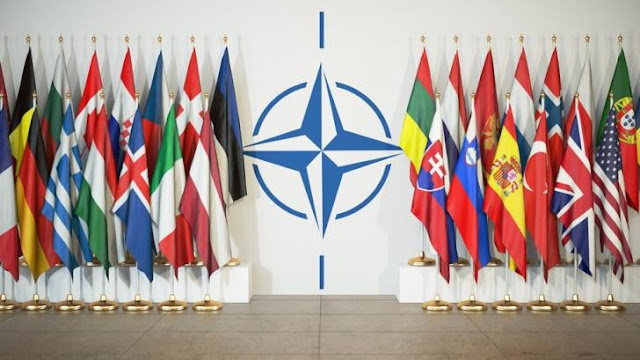Filenews 15 April 2022
By Alison Durkee
The prime ministers of Sweden and Finland said at a news conference Wednesday that they are considering their countries joining NATO - a move that would ensure that members of the North Atlantic Alliance would assist Stockholm and Helsinki in their defences against a possible Russian invasion. At the same time, Moscow is threatening retaliation if the two Nordic countries join NATO.
As is well known, NATO member states are linked to a "collective defence" agreement, which means that "attacking an ally is considered an attack on all all allies" and requires other countries to assist militarily the one under attack.
Finland and Sweden maintained an attitude of neutrality towards the Soviet Union during the Cold War, in which the North Atlantic Alliance was created. Following the Russian invasion of Ukraine, the two countries are considering joining the Alliance after fears have been raised that Moscow could invade the Nordic countries as well. It is recalled that the third country of the Scandinavian Peninsula, Norway, is already a member of NATO.
Finland, bordered to the east by Russia, declared its independence from Moscow in 1917 and in 1939 was invaded by the Soviet Union. Sweden does not share a land border with Russia, but according to Deutsche Welle, Moscow could use the Swedish island of Gotland, in the Baltic Sea, to attack Stockholm if war broke out in the region.
Swedish Prime Minister Magdalena Anderson and her Flemish counterpart Sana Marin told reporters on Wednesday that both countries are reconsidering their NATO membership, with Marin noting: "Everything changed when Russia invaded Ukraine."
The Finnish prime minister stressed that the decision will be taken "within the next few weeks", while Reuters reported that Stockholm's review of the issue is expected to be completed by the end of May. A DW report estimates that the two countries are likely to decide to join the Alliance by June.
In the face of this eventuality, Russia will not stand idly by. Kremlin spokeswoman Dmitry Peskov has signalled that Russia will "restore the balance of the situation" if Finland and Sweden enter the NATO circle, while Russian Foreign Ministry spokeswoman Maria Zakharova stressed in February that such a move would have "military and political consequences."
"There is the milestone date of February 24," Anderson commented on Wednesday, referring to the day the Russian invasion began. "Since that day and after, the security landscape has completely changed."
Earlier in April, Peskov reiterated "that NATO is essentially a means of confrontation", commenting on the possible accession of Finland and Sweden to the Alliance. "NATO does not ensure peace and stability. Of course its enlargement will not strengthen the climate of security in Europe."
NATO membership will be a months-long or multi-year process for Helsinki and Stockholm, as candidate countries will have formal consultations with alliance leadership and will then have to receive approval from all existing members. (In the U.S., 2/3 of the Senators should vote for the accession of the countries). However, Finland and Sweden will probably get through this process more easily than other countries, as NATO Secretary General Jens Stoltenberg has already said that these countries have met Alliance standards of "civilian political and democratic control of security institutions and armed forces". Elizabeth Browe, a fellow at the American Enterprise Institute, stressed in an article in Politico that it is likely that the two countries will receive an invitation from NATO to start the process much faster than the long wait that has applied to other countries. Stoltenberg appeared "confident that the Alliance will find ways to address concerns about the period between the deadly request and its approval," according to the Washington Post newspaper, meaning NATO could provide some kind of protection if Russia retaliated against Finland or Sweden before the two countries become official members.
Finland and Sweden will have allied support - militarily - as they are members of the European Union, and all EU members have an obligation under the bloc's treaty to assist other members if they are attacked militarily. (NATO would also oblige the US to provide military support.) In a letter to the President of the European Council, Marin and Anderson reminded the EU of this commitment if needed.
NATO has been an important player in escalating Russia's aggressive stance towards Ukraine over the past 14 years, but also in supporting Kiev during the 50 days of hostilities. Former US President George W. Bush's insistence on expanding NATO by sending an open invitation to join Ukraine and Georgia provoked a strong reaction from Vladimir Putin, who was outraged at the prospect of the North Atlantic Alliance reaching Russia's borders. NATO member states do not intervene militarily in Ukraine, as the country does not belong to the Alliance, but have provided significant support to Kiev during the conflict. NATO has doubled its military presence in Eastern Europe in response to the Russian invasion, as the BBC points out, and member states have donated military equipment to Ukraine's armed forces.
Ukraine is unlikely to join NATO any time soon. Although Ukraine's Constitution includes an amendment committing it to seeking NATO membership, Kiev's effort is hampered by the fact that it does not yet meet alliance requirements in terms of democratic institutions, the New York Times notes, and will have to proceed with more anti-corruption reforms to pave the way for accession. NATO also wants its members to "strengthen the alliance's security and not undermine it," Rafael Los, coordinator of International Relations at the European Council, told Euronews. The Alliance does not seem willing to engage in Ukraine's dead-end territorial disputes with Russia over Crimea and the Donbass region.
Source: Forbes
